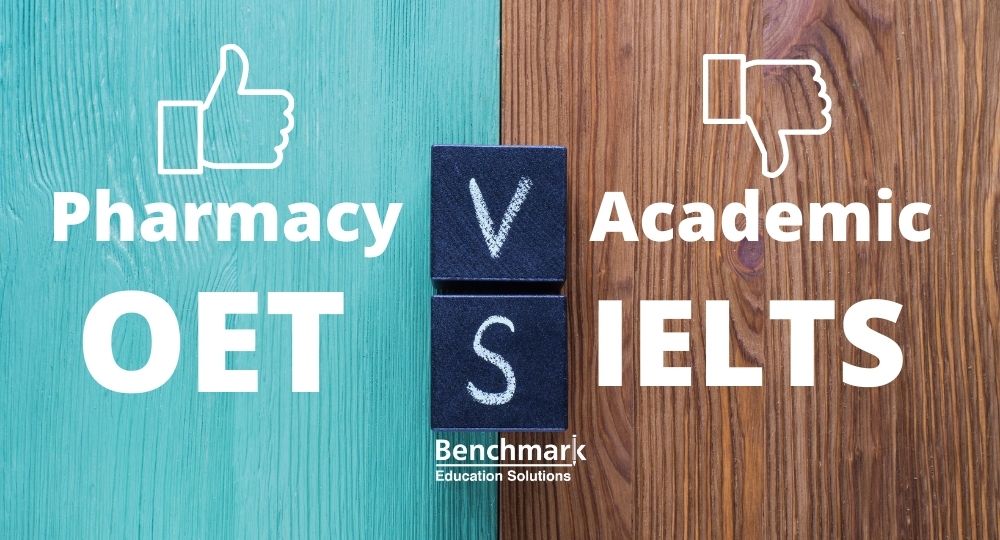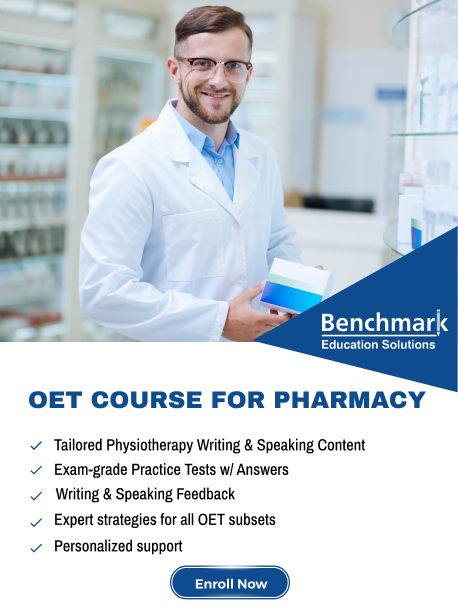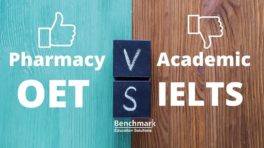Why Pharmacy OET is a Better Test than IELTS Academic


Recently, the General Pharmaceutical Council of the United Kingdom announced that it would accept the results of the Pharmacy Occupational English Test (OET) as an alternative to the International English Language Testing System (IELTS) as proof of English proficiency. Considering that information, we would like to explain why doing the Pharmacy OET is a better choice for prospective pharmacists than sitting the IELTS Academic test.
Table of Contents
1. What is Pharmacy OET?
The OET is an exam designed to prove the English proficiency of medical professionals and is tailored to people who wish to move to certain countries (like the UK) in order to join the medical profession. As such, it is a great option because it is more career-specific than general language exams like IELTS. Watch this OET Overview video to find out everything about the OET exam.
OET candidates must choose which version they want to take. There are various healthcare sectors catered for, including dentistry, dietetics, nursing, and optometry. One of the given choices is pharmacy, which of course would be the choice for people wishing to go abroad to work as a pharmacist.
The OET is divided into four sub-tests: listening, reading, speaking, and writing. The listening and reading sections will be the same for people in different professions, but the speaking and writing ones will be unique. That means pharmacists, for example, can expect to have speaking and writing sub-tests directly related to pharmacy. This can be considered a major benefit as the material will be much more familiar.
2. IELTS Academic vs OET
The IELTS Academic and OET are both English tests but IELTS is far more general than OET. In the IELTS exam, you can expect to answer questions and deal with materials on an incredibly wide range of topics, such as the environment, sports, government, and childhood. Of course, not all of this is relevant for all people and so for healthcare professional, it may be a better option to prepare for the OET exam instead.
The benefits of doing OET over IELTS Academic are pretty clear. For trained medical professionals, OET offers a chance to prove their English proficiency in a more suitable environment and on topics with which they are familiar. Whilst in IELTS you may be asked abstract questions on government policy, for OET you already know there will be a letter to be written to the patient or their next of kin. You do not then have to prepare for such a wide range of materials, giving you a better chance of success.
Many healthcare professionals also prefer OET because it allows them to demonstrate their knowledge and skills in their chosen field. Some people feel a little silly doing IELTS and talking on issues that they know nothing about. Whilst it can be general enough to allow everyone to have a say, IELTS can be somewhat intimidating because of its randomness.
Of course, then there is the dreaded IELTS writing test… Some very talented people sincerely believe that it is impossible to score higher than band 7 for IELTS! This is not really true, but it is certainly more difficult than it should be. People who can easily get band 8 or 9 in listening and speaking generally struggle to achieve band 7 in writing and are often stuck at 6 or 6.5.
Thankfully, the OET writing sub-test is more reasonable and people who have experience in healthcare and English can usually deal with it better. There are many reasons but again this partly relates to the aforementioned issue of randomness in subject matter. When it comes to OET, you can prepare for the different types of written material and the vocabulary and grammar specific to your field of expertise. This makes it easier to prepare for than IELTS.
3. OET and IELTS Grades for Pharmacists
According to the General Pharmaceutical Council UK, prospective pharmacists should either score a minimum of band 7 in each section of the IELTS Academic test or else get at least a grade B in the four OET sub-tests. These grades are essentially the same, but many people think that OET grades for pharmacists are easier to achieve because they are career-specific, giving them a better chance of knowing the vocabulary and material well enough to excel at it.
4. Conclusion
Comparing the two types of exam, it seems that doing OET is probably the best option, and indeed OET writing for pharmacists certainly makes it more realistic that you can get your target score and thus move forward with the process of finding a healthcare job in the UK or elsewhere. If you are unsure, you can spend some time researching the two exams, but note that the frustrations felt by IELTS Academic candidates are a good sign that this exam is more challenging and thus it might be better to do the OET, which will seem more familiar and approachable to people with a background in pharmacy.















Hello. I’m Mokhinur. I’m uzbek. Nowadays, I study in Tashkent Pharmaceutical institute .I have answer. Is the OET for all states?